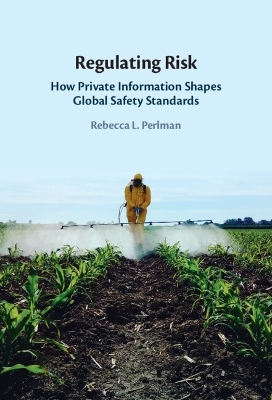
Regulating Risk
How Private Information Shapes Global Safety Standards
Seiten
2023
Cambridge University Press (Verlag)
978-1-009-29192-7 (ISBN)
Cambridge University Press (Verlag)
978-1-009-29192-7 (ISBN)
The book offers a new explanation for how companies create barriers to domestic competition and international trade. The book should appeal to an academic audience interested in regulation, trade, and government-business relations. This includes those in the political science, public policy, economics, law, and science and technology fields.
When governments impose stringent regulations that impede domestic competition and international trade, should we conclude that this is a deliberate attempt to protect industry or an honest effort to protect the population? Regulating Risk offers a third possibility: that these regulations reflect producers' ability to exploit private information. Combining extensive data and qualitative evidence from the pesticide, pharmaceutical, and chemical sectors, the book demonstrates how companies have exploited product safety information to win stricter standards on less profitable products for which they offer a more profitable alternative. Companies have additionally supported regulatory institutions that, while intended to protect the public, also help companies use information to eliminate less profitable products more systematically, creating barriers to commerce that disproportionally disadvantage developing countries. These dynamics play out not only domestically but also internationally, under organizations charged with providing objective regulatory recommendations. The result has been the global legitimization of biased regulatory rules.
When governments impose stringent regulations that impede domestic competition and international trade, should we conclude that this is a deliberate attempt to protect industry or an honest effort to protect the population? Regulating Risk offers a third possibility: that these regulations reflect producers' ability to exploit private information. Combining extensive data and qualitative evidence from the pesticide, pharmaceutical, and chemical sectors, the book demonstrates how companies have exploited product safety information to win stricter standards on less profitable products for which they offer a more profitable alternative. Companies have additionally supported regulatory institutions that, while intended to protect the public, also help companies use information to eliminate less profitable products more systematically, creating barriers to commerce that disproportionally disadvantage developing countries. These dynamics play out not only domestically but also internationally, under organizations charged with providing objective regulatory recommendations. The result has been the global legitimization of biased regulatory rules.
Rebecca L. Perlman is an assistant professor of politics and international affairs at Princeton University. Her research has been published in the American Journal of Political Science, Science Advances, Comparative Political Studies, International Studies Quarterly, and the Journal of Legal Analysis. She has a Ph.D. from Stanford and a master's from the Fletcher School at Tufts. Her undergraduate degree is from Princeton, where she graduated summa cum laude and phi beta kappa.
1. The informational origins of regulatory barriers; 2. Private information in the regulation of risk; 3. A theory of regulatory barriers; 4. Seeking stricter standards; 5. How precaution begets bias; 6. The internationalization of bias; 7. Challenging barriers.
| Erscheinungsdatum | 20.03.2023 |
|---|---|
| Zusatzinfo | Worked examples or Exercises; 15 Tables, black and white; 9 Line drawings, black and white |
| Verlagsort | Cambridge |
| Sprache | englisch |
| Maße | 151 x 236 mm |
| Gewicht | 472 g |
| Themenwelt | Recht / Steuern ► EU / Internationales Recht |
| Sozialwissenschaften ► Politik / Verwaltung ► Europäische / Internationale Politik | |
| Wirtschaft ► Volkswirtschaftslehre ► Makroökonomie | |
| Wirtschaft ► Volkswirtschaftslehre ► Wirtschaftspolitik | |
| ISBN-10 | 1-009-29192-0 / 1009291920 |
| ISBN-13 | 978-1-009-29192-7 / 9781009291927 |
| Zustand | Neuware |
| Haben Sie eine Frage zum Produkt? |
Mehr entdecken
aus dem Bereich
aus dem Bereich
Studienbuch
Buch | Hardcover (2023)
De Gruyter Oldenbourg (Verlag)
44,95 €
erfolgreiche Interessenvertretung durch Prozesskompetenz im komplexen …
Buch | Hardcover (2023)
Wiley-VCH (Verlag)
42,00 €


